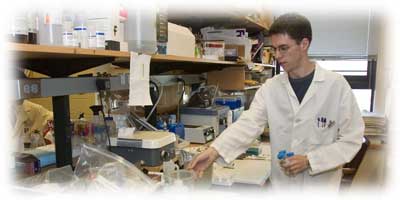 |
|||||||||||||||||
|
|||||||||||||||||
|
Research
About Our Research The overall goal in the laboratory is to discover and understand the function of important mediators and effectors involved in innate (autophagy, pathogen-containing vacuole) and adaptive (T cell activation) immunity. Of particular interest are the cellular components and regulatory networks, which interact dynamically within temporal, spatial and patho-physiological contexts of innate immunity. We are pursuing integrative systems approaches that closely couple genome-wide experimentation with high-throughput assays (RNAi and cDNA screens) and computational methods. Using these approaches, we are interested in addressing the following questions:
The adaptive immunity program focuses on the elucidation of signal transduction pathways coordinated by the CARMA/Dlg family of scaffold proteins. Crohn’s disease and ulcerative colitis are debilitating inflammatory diseases of the gastrointestinal tract collectively known as inflammatory bowel diseases. Among complex diseases, genetics has been particularly successful in the identification of genes for IBD with recent efforts in genome-wide association studies bringing the total number of genes to more than 40. These studies have highlighted the significance of the relationship between intracellular responses to microbes and the regulation of adaptive immunity in the pathogenesis of IBD. Systems biology approaches to understand human disease signaling networks The discovery of important mediators and effectors involved in immunity requires a deeper exploration of how these function as integrated systems. Especially of interest are the cellular components and regulatory networks which interact dynamically within temporal, spatial and pathophysiological contexts. We are pursuing integrative systems approaches that closely couple genome-wide experimentation with bioinformatics and computational methods. |
|||||||||||||||||
|
|
|||||||||||||||||
| Copyright © 2006-2012 The Massachusetts General Hospital | |||

